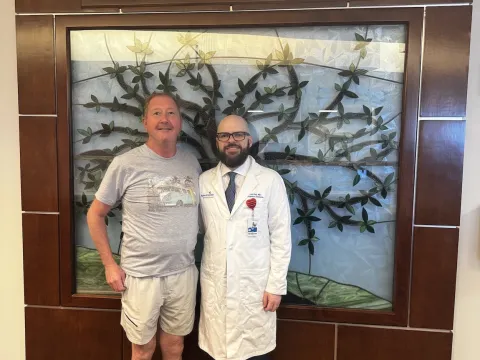- AdventHealth
In June, AdventHealth for Children pediatric interventional cardiologists were the first in Florida to implant a tetralogy of Fallout patient with the Alterra Adaptive Prestent and Valve Implant to correct severe pulmonary regurgitation without open-heart surgery.
Patients with congenital heart diseases where the pulmonary artery is involved, including tetralogy of Fallout, transposition of the great arteries (TGA), and truncus arteriosus, often suffer from right ventricular outflow tract (RVOT) dysfunction after their initial surgical repair. This can lead to decreased exercise capacity and increased risk of malignant arrhythmias. Over the course of a lifetime, these patients typically require several pulmonary valve replacements to correct RVOT dysfunction.
“Before availability of the new Alterra prestent and valve technology, placing valves using percutaneous technology was only possible if the pulmonary valve was a maximum of 28 mm,” explains Zahid Amin, MD, Medical Director of Pediatric and Congenital Cardiology at AdventHealth for Children. “If it was larger, repair required that the patient undergo open-heart surgery, and more than 50% of tetralogy of Fallout patients have valves larger than 28 mm.”

AdventHealth for Children
The new Alterra transcatheter technology was approved in December 2021 by the U.S. Food and Drug Administration (FDA) for patients who weigh over 20 kilograms, and it can accommodate valves up to 40 mm.
“This significantly increases the number of patients who can have their valve replaced through an interventional approach,” shares Dr. Amin. “Most of these patients are able to go home the morning after the procedure and can be back to work within a few days.”
There are more adult survivors of tetralogy of Fallout than any other cyanotic heart disease with 30-year survival rates ranging from 78% to 95% for those without other genetic conditions. Because the average lifespan of pulmonary valve implants is about 10 years, many of these patients have already had multiple open-heart surgeries.
“Each surgery becomes increasingly difficult for the patient in terms of pain and recovery time in addition to the risk of infection and anxiety that comes with the more invasive approach,” says Dr. Amin. “With the new Alterra implant technology, a valve can be placed and then another valve within that valve, allowing these patients to go 20 to 30 years before they require another open-heart surgery and reducing the total number of open-heart surgeries they may need over their lifetime. This is a tremendous benefit for our patients.”
For more information or to refer a patient, click here.
Recent News

AdventHealth Graduate Medical Education Program Celebrates 50 Years
Growing from a family practice residency to 24 accredited programs, AdventHealth’s Graduate Medical Education (GME) program celebrates 50 years.

AdventHealth Performs Central Florida’s First Liver Transplant for Unresectable Colorectal Liver Metastases
In June 2025, AdventHealth Abdominal Transplant Surgeon and Surgical Oncologist Ryan Day, MD, worked with a multidisciplinary team to perform Central Florida’s first liver transplant for unresectable...

AdventHealth Neuroscience Institute First in Florida to be Recognized as a GammaTile Center of Excellence
GammaTile is the first and only tile-based radiation therapy for the treatment of
operable brain tumors. The AdventHealth Neuroscience Institute began performing GammaTile procedures in 2021 and was...

An AdventHealth Collaboration Explores the Impact of Microgravity and Electrical Stimulation on Muscle Cell Health in Space
Using a muscle lab-on-chip model aboard the International Space Station (ISS), AdventHealth Translational Research Institute’s Dr. Paul Coen has been working with a multidisciplinary team from the...

AdventHealth Neuroscience Institute Administers First Dose of Investigative NK Cell Therapy to Person with Alzheimer’s Disease
Under a single compassionate use Investigational New Drug (IND) authorization cleared by the U.S. Food and Drug Administration (FDA), the AdventHealth Neuroscience Institute worked with NKGen Biotech...

New Study Published in the New England Journal of Medicine Shows the Addition of Regional Nodal Irradiation Does Not Decrease Rate of Invasive Breast Cancer Recurrence in Patients with Negative Axillary Nodes Following Neoadjuvant Chemotherapy
Findings of the phase III, multicenter, randomized NSABP B-51-RTOG 1304 clinical trial were recently published in the New England Journal of Medicine with AdventHealth Cancer Institute’s Dr. Mamounas...

AdventHealth Study Exploring the Use of MR-Guided Focused Ultrasound (MRgFUS) to Disrupt the Blood-Brain Barrier for Treatment of Alzheimer’s Disease
Under the leadership of Dr. Valeria Baldivieso and Dr. Chandan Reddy, the AdventHealth Research Institute is the first and only site in Orlando offering the Exablate Blood-Brain Barrier (BBB)...

AdventHealth Research Institute Offers Phase II Clinical Trial of Etanercept for Treatment of Blast-Induced Tinnitus
Approximately 1 billion people throughout the world suffer from tinnitus (ringing in the ears), and it is the number one disability of those who serve in the U.S. military. The condition can disrupt...

AdventHealth’s Karen D. Corbin, PhD, RD, Contributed to New American Diabetes Association Consensus Statement on Liver Disease in Diabetes
Metabolic dysfunction associated steatotic liver disease (MASLD), formerly referred to as nonalcoholic fatty liver disease (NAFLD), affects about 70% of people with type 2 diabetes, placing them at...

AdventHealth East Orlando First in Florida to Earn Advanced Foot & Ankle Surgery Certification from DNV
AdventHealth East Orlando recently became the first hospital in Florida to earn Advanced Foot & Ankle Surgery Certification from DNV, a worldwide, independent certification body.

Recent Study on How Physical Activity May Boost Neurocognition in Late Adulthood Featured in the Medical Journal Age and Ageing
In a new article published in the medical journal Age and Ageing, AdventHealth Research Institute’s Dr. Audrey Collins shares the results of a recent study evaluating the impact of exercise on...

AdventHealth Research Contributed to New Method for Tracking Diet and Its Impacts on Human Health
Accurately determining food intake remains a challenge in nutrition research. A new study published in Nature Metabolism and co-authored by Dr. Corbin introduces a metagenomics-powered approach to...
